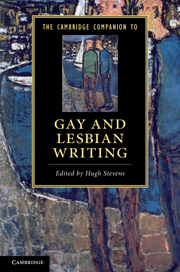Book contents
- Frontmatter
- Homosexuality and literature: an introduction
- Part I Repression and Legitimation
- 1 Homosexual writing on trial: from Fanny Hill to Gay News
- 2 Psychoanalysis, homosexuality and modernism
- 3 Lesbian modernism: writing in and beyond the closet
- 4 The erotics of transgression
- 5 Normality and queerness in gay fiction
- Part II Affiliations
- Part III Literary Traditions
- Guide to further reading
- Index
1 - Homosexual writing on trial: from Fanny Hill to Gay News
from Part I - Repression and Legitimation
Published online by Cambridge University Press: 28 January 2011
- Frontmatter
- Homosexuality and literature: an introduction
- Part I Repression and Legitimation
- 1 Homosexual writing on trial: from Fanny Hill to Gay News
- 2 Psychoanalysis, homosexuality and modernism
- 3 Lesbian modernism: writing in and beyond the closet
- 4 The erotics of transgression
- 5 Normality and queerness in gay fiction
- Part II Affiliations
- Part III Literary Traditions
- Guide to further reading
- Index
Summary
Shortly after the English capital suffered two rare earthquakes in February and March 1750, the Bishop of London, Thomas Sherlock, rushed into print with a controversial pamphlet declaring that the seismic ructions expressed nothing less than a 'strong summons, from God, to repentance'. Sherlock asserts this 'particular mark of divine vengeance' was a stern reminder of the 'destruction of Sodom by fire from heaven' recorded in many parts of the Bible (7). More to the point, he blames these cautionary events on the 'unnatural lewdness, of which we have heard so much of late' (7). Here he implicitly refers to the 'vile book' that he had, a year earlier, done his utmost to 'stop' in its 'progress'. In March 1749, Sherlock had already expressed his dismay to the Secretary of State that the 'prosecution against the printer and publisher of the Memoirs of a Lady of Pleasure' (commonly known as Fanny Hill, first published in two instalments in November 1748 and February 1749) had resulted in an expurgated edition that 'le[ft] out some things, which were thought most liable to the law and to expose the author and publisher to punishment' (56-7). The very idea that even a heavily edited version of this erotic narrative should remain in circulation, after some sixty copies of the first edition had been sold, contributed greatly to his belief that the time had come for Londoners to suffer God's wrath (56). The Memoirs, which had subjected its author, John Cleland, to a fine of 100 and a short spell in jail, remained for Sherlock a 'reproach to the honour of the government, and the law of the country' (57).
- Type
- Chapter
- Information
- The Cambridge Companion to Gay and Lesbian Writing , pp. 17 - 33Publisher: Cambridge University PressPrint publication year: 2010
- 2
- Cited by

